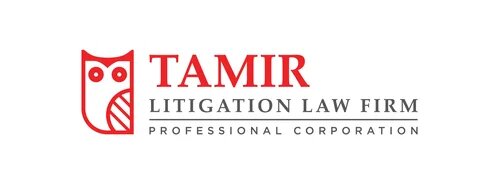Best Labor Law Lawyers in Canada
Share your needs with us, get contacted by law firms.
Free. Takes 2 min.
Or refine your search by selecting a city:
List of the best lawyers in Canada
About Labor Law in Canada
Labor law in Canada is a system of laws that governs the relationship between employers, employees, and unions. It encompasses both federal and provincial laws, with the purpose of ensuring fair treatment of workers and protecting their rights. The Canada Labour Code is the primary piece of federal legislation that regulates labor practices, but each province and territory also has its legislation that covers labor relations, employment standards, and worker rights. This framework aims to promote a balanced and healthy work environment across the country.
Why You May Need a Lawyer
There are various scenarios in which individuals might require legal assistance in the realm of labor law. Some common situations include:
- Unfair Dismissal: If you believe you have been wrongfully terminated, a lawyer can help assess your case and determine any entitlements.
- Discrimination and Harassment: Legal guidance can be crucial if you encounter discrimination or harassment in the workplace.
- Contract Negotiation: Lawyers can assist in understanding and negotiating the terms of employment contracts or collective agreements.
- Workplace Safety Issues: If your safety at work is compromised, getting legal advice can ensure your rights are protected.
- Wage and Hour Disputes: Labor lawyers can help resolve issues related to unpaid wages or overtime.
Local Laws Overview
Labor law in Canada is structured around both federal and provincial jurisdictions. The following are key aspects relevant to labor law:
- Employment Standards: Provides minimum standards such as wage rates, overtime, vacation pay, and other working conditions.
- Occupational Health and Safety: Legislates standards to ensure safe and healthy working environments.
- Human Rights Legislation: Protects employees against discrimination on various grounds, including race, gender, and disability.
- Collective Bargaining and Unions: Regulates the rights of workers to join unions and engage in collective bargaining.
- Worker’s Compensation: Offers protection and compensation for workers injured on the job.
Frequently Asked Questions
What are my basic employment rights in Canada?
Your basic employment rights include minimum wage, hours of work, overtime pay, vacation time, and leave entitlements. These may vary slightly based on provincial legislation.
Can I be fired without notice or reason?
In most provinces, employers must provide reasonable notice or pay in lieu of notice unless there is cause for dismissal. However, the specific terms depend on whether there is an employment contract or collective agreement.
What is considered workplace discrimination?
Workplace discrimination involves unfair treatment based on factors like race, gender, age, or disability. Canadian human rights legislation prohibits such discrimination.
How do I know if I am entitled to overtime pay?
Eligibility for overtime pay is dictated by provincial employment standards, which typically require overtime pay be provided for hours worked beyond the normal workweek (usually 40 hours).
What should I do if I experience harassment at work?
You should report the harassment to your employer or human resources department. If the issue is not resolved internally, consulting a lawyer or filing a complaint with a human rights commission may be appropriate.
How can I dispute an unfair termination?
Begin by reviewing your employment contract and any applicable employment standards. Legal advice can help in assessing the situation and taking the right steps, possibly including filing a complaint or lawsuit.
What rights do unionized employees have?
Unionized employees have rights detailed in collective agreements. They can negotiate wages, working conditions, and have protection against unjust discharge.
Is workplace safety a right in Canada?
Yes. Employers must abide by occupational health and safety regulations to ensure the workplace is safe and risks are minimized. Employees have the right to refuse unsafe work.
Can my employer change my job duties without my consent?
Changes to your job duties may constitute a breach of contract if they are significant. Any changes generally require mutual consent. Consultation with a lawyer can help evaluate your situation.
What recourse do I have if my wages are unpaid?
Workers can file a claim with the relevant provincial employment standards office. Legal consultation can also assist in securing unpaid wages.
Additional Resources
For more assistance, consider the following resources:
- Government of Canada - Labour Program
- Provincial Employment Standards Offices
- Canadian Human Rights Commission
- Workers’ Compensation Boards
- Local Legal Clinics and Pro Bono Services
Next Steps
If you find yourself needing legal advice in the field of labor law, consider the following steps:
- Document your concerns and gather all relevant evidence.
- Consult relevant governmental bodies or employment standards offices for initial guidance.
- Search for a qualified labor lawyer or legal clinic that specializes in labor law issues.
- Schedule a consultation to discuss your situation and explore your options.
- Review any contracts or agreements to understand your legal position.
Taking these steps can help you navigate labor law issues more effectively and protect your rights in the workplace.
Lawzana helps you find the best lawyers and law firms in Canada through a curated and pre-screened list of qualified legal professionals. Our platform offers rankings and detailed profiles of attorneys and law firms, allowing you to compare based on practice areas, including Labor Law, experience, and client feedback.
Each profile includes a description of the firm's areas of practice, client reviews, team members and partners, year of establishment, spoken languages, office locations, contact information, social media presence, and any published articles or resources. Most firms on our platform speak English and are experienced in both local and international legal matters.
Get a quote from top-rated law firms in Canada — quickly, securely, and without unnecessary hassle.
Disclaimer:
The information provided on this page is for general informational purposes only and does not constitute legal advice. While we strive to ensure the accuracy and relevance of the content, legal information may change over time, and interpretations of the law can vary. You should always consult with a qualified legal professional for advice specific to your situation.
We disclaim all liability for actions taken or not taken based on the content of this page. If you believe any information is incorrect or outdated, please contact us, and we will review and update it where appropriate.
Browse labor law law firms by city in Canada
Refine your search by selecting a city.
















